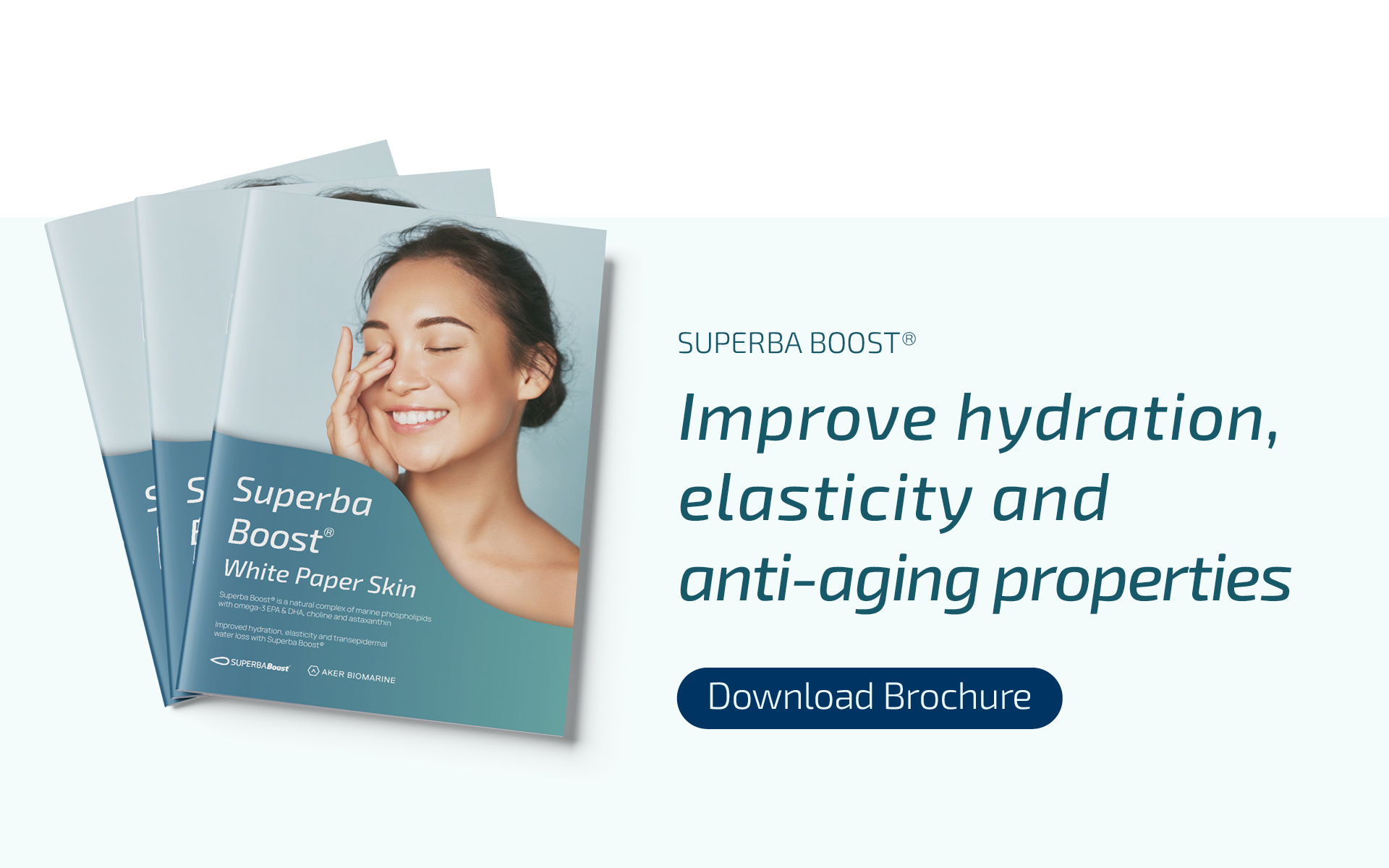Results from two randomized, double-blind, placebo-controlled, pilot studies show that krill oil supplementation strengthens skin barrier function and improves hydration and elasticity of the skin in healthy adults.
Two new studies, published together in the Journal of Cosmetic Dermatologyshow the positive effects on skin barrier function from krill oil supplementation. The purpose of these studies was to investigate the impact of two different doses of krill oil on skin barrier function (transepidermal water loss, TEWL) in healthy adults with secondary outcomes related to skin hydration, elasticity and the Omega-3 Index.
Both studies indicated that daily oral intake of krill oil (1 and 2 g) resulted in significant improvements in strengthening the skin barrier function as well as improving hydration and elasticity, compared to the placebo group. Significant correlations were also observed between these improvements and the Omega-3 Index in red blood cells, highlighting the link between omega-3 fatty acids and skin health.
“For years we have looked at how krill oil, with its phospholipids and long-chain omega-3 fatty acids, can positively impact skin health,” said Katina Handeland, PhD, Director R&D, Human Nutrition. “The skin is the body’s largest organ, and its health and hydration rely on lipid and ceramide levels, which are influenced by nutrition. Omega-3 EPA and DHA modulate the lipid composition of skin cell membranes and their associated lipid mediators, thereby supporting skin barrier function.
Phospholipids have a unique molecular function enabling them to both attract and repel water, which enables them to retain water within the skin. Additionally, both dietary essential fatty acids and phospholipids have shown to give a positive impact on skin ceramide levels, which are known to decline with age. The positive results in these two trials help validate evidence from previous research by showing the positive impact krill oil has in improving skin barrier function and moisture retention.”
Study methods and outcomes:
- Two randomized, double-blind, placebo-controlled, pilot studies were conducted in healthy adults with a normal to slightly dry skin at baseline (with healthy TEWL levels).
- In Study 1, 51 participants consumed 1 g of Superba Boost® krill oil or placebo daily.
- In Study 2, 50 participants consumed 2 g of Superba Boost® krill oil or placebo daily.
- The outcomes were assessed at baseline, 6 and 12 weeks.
- The krill oil supplemented groups significantly and dose-dependently increased their Omega-3 Index (% of EPA+DHA in red blood cells) versus placebo in both studies.
- The krill oil groups in both studies showed statistically significant beneficial reductions in TEWL and increases in hydration and elasticity when compared to placebo.
- There were significant linear relationships between changes in the Omega-3 Index and changes in TEWL, hydration and elasticity in both studies.
- Aker BioMarine led the study together with a scientist from the Faculty of Health and Wellbeing, University of Sunderland (United Kingdom).
The importance of krill oil as a supplement solution for skin health
Dry skin is one of the biggest concerns among consumers which is why it’s important to look at nutritional solutions like krill oil phospholipids for its positive effects on skin health. The essential nutrients found in krill oil (phospholipids, omega-3 fatty acids EPA and DHA, choline, and astaxanthin) all work together to protect the skin’s barrier.
Phospholipids are extremely important in the integrity and the structure of our cells, and they also help deliver nutrients to cells around the body including our skin cells.
EPA and DHA aid in skin function and help to maintain both the hydration and elasticity of the skin. They are also vital for modulating inflammation.
Studies show that krill oil can protect the skin from UV radiation by affecting genes responsible for producing hyaluronic acid and collagen. These two molecules help prevent wrinkles and maintain skin moisture, therefore krill oil may help keep the skin healthy and youthful.
“In healthy skin, there is a balance between the water content and the amount of water passing through the skin,” adds Lena Burri, Director R&D, Human Nutrition. “The skin acts as a protective barrier between the body's internal environment and the external world. Healthy skin is influenced by a complex interaction of many internal and external factors. Supplementing with krill oil will help giving the skin the daily boost it needs.”

